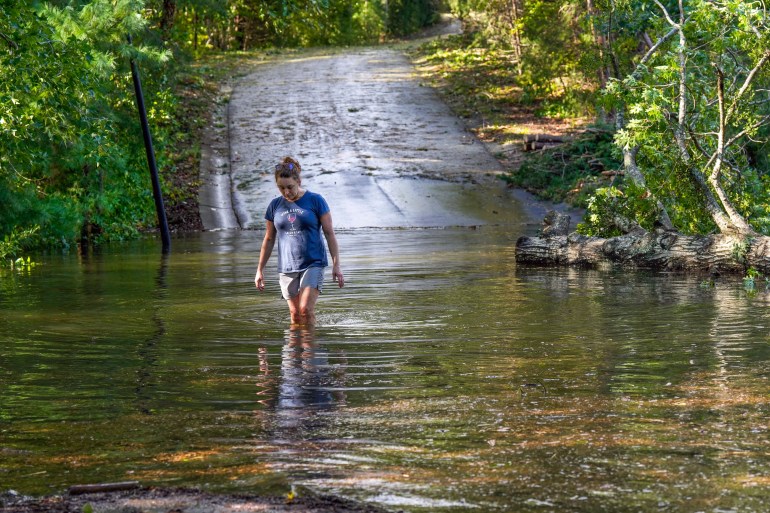North Carolina lawmakers have passed almost $900m in disaster relief, but that’s still way short of the likely cost.
Lawmakers in the state of North Carolina have passed almost $900m in aid spending for Hurricane Helene disaster relief, but they say that is only a preliminary figure as the final bill is still being calculated.
State legislators unanimously passed $604m in additional funding on Thursday, on top of $273m that was previously approved.
But the catastrophic flooding and destruction caused by Hurricane Helene in western North Carolina last month likely caused at least a record $53bn in damages and recovery needs, the state’s Governor Roy Cooper announced a day earlier.
If confirmed, this figure would make Helene the 10th costliest weather disaster in the United States since 1980, according to the National Oceanic and Atmospheric Administration (NOAA).
The estimate only includes damages in North Carolina, but Helene devastated parts of multiple states in the US Southeast, killing 214 people, so the final cost could rank higher.
The Florida Office of Insurance Regulation estimated that Hurricane Helene caused $13.4bn in insured losses in the state as of October 17.
Cooper said he has requested an initial $3.9bn package to start rebuilding efforts, particularly involving critical infrastructure, homes, businesses, farms and schools in North Carolina damaged by Helene.

‘A good start’
“Helene is the deadliest and most damaging storm ever to hit North Carolina,” Cooper said on Wednesday while unveiling his spending request to the state General Assembly.
“These initial funds are a good start, but the staggering amount of damage shows we are very much on the front end of this recovery effort,” he added.
Cooper told reporters the state’s previous record for storm damage was $17bn from Hurricane Florence, which struck eastern North Carolina in 2018.
Helene and its aftermath caused 1,400 landslides and damaged more than 160 water and sewer systems, at least 9,650 kilometres (6,000 miles) of roads, more than 1,000 bridges and culverts and an estimated 126,000 homes, the budget office said.
Some 220,000 households are expected to apply for federal assistance.
The damage report projects $48.8bn in direct or indirect damages, along with $4.8bn of anticipated mitigation expenses. The budget office estimates the federal government will cover $13.6bn, with private and other sources covering $6.3bn.
Most of the losses will never be recovered, legislators say, because so few homeowners and farmers in the disaster areas had flood or crop insurance.
Close to 93 percent of homes with flood damage verified by the Federal Emergency Management Agency (FEMA) lacked flood insurance, the report said.
Cooper’s request includes $475m for a recovery programme for businesses in the hardest-hit areas, $225m for grants to farmers for uninsured losses; and $100m for public school and community college capital needs.
Cooper also wants $325m to help homeowners and renters with rebuilding and minor repairs immediately while a larger programme dependent on federal funds is implemented.

Death toll reduced
North Carolina state officials have reported 96 deaths from Helene, which brought historic levels of rain and flooding to the mountains in late September.
The death toll was reduced after one of the worst-hit counties discovered it had overcounted fatalities by as many as 30. Buncombe County, which previously reported 72 deaths, reduced its count to 42.
As a result, The Associated Press adjusted its multistate tally for Helene to 214 deaths.
